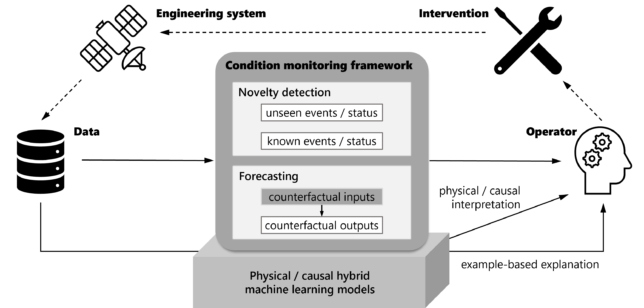Just as it is important for us to monitor our own body in order to maintain good health, we should have an accurate understanding of the state of engineering systems in order to prevent failures. In this project, entitled "Interpretable Condition Monitoring for Complex Engineering Systems", we investigate machine learning methods to build a condition monitoring framework and apply it to real engineering systems such as artificial satellites and unmanned aerial vehicles.
 An important research question of the project is how to make the condition monitoring methods interpretable for human operators. The lack of interpretability of machine learning models often hinders the effective integration of learning-based methods into real engineering systems. This is particularly evident in condition monitoring applications, where human operators should manually investigate alarms generated by condition monitoring for reasons such as system safety. We address this issue through the idea of grey-box (hybrid) modeling, where data-driven, machine learning models and theory-driven, expert models are combined. Expert models of engineering systems are interpretable by design but often cannot accurately predict the state of the system in real-world situations. Machine learning models can adapt to real-world situations based on data but lack interpretability. We take the best of the two regimes to build data-driven condition monitoring methods that are reasonably interpretable.
An important research question of the project is how to make the condition monitoring methods interpretable for human operators. The lack of interpretability of machine learning models often hinders the effective integration of learning-based methods into real engineering systems. This is particularly evident in condition monitoring applications, where human operators should manually investigate alarms generated by condition monitoring for reasons such as system safety. We address this issue through the idea of grey-box (hybrid) modeling, where data-driven, machine learning models and theory-driven, expert models are combined. Expert models of engineering systems are interpretable by design but often cannot accurately predict the state of the system in real-world situations. Machine learning models can adapt to real-world situations based on data but lack interpretability. We take the best of the two regimes to build data-driven condition monitoring methods that are reasonably interpretable.
 The project is funded by the Swiss National Science Foundation under the Strategic Japanese-Swiss Science and Technology Program. It is an international collaborative project with a counterpart in Japan; we are working with the Artificial Intelligence Lab of the Research Center for Advanced Science and Technology, the University of Tokyo.
The project is funded by the Swiss National Science Foundation under the Strategic Japanese-Swiss Science and Technology Program. It is an international collaborative project with a counterpart in Japan; we are working with the Artificial Intelligence Lab of the Research Center for Advanced Science and Technology, the University of Tokyo.
Relevant publication from the DMML group:
- Naoya Takeishi, Alexandros Kalousis: Physics-Integrated Variational Autoencoders for Robust and Interpretable Generative Modeling. Advances in Neural Information Processing Systems 34, 2021.
- Naoya Takeishi, Alexandros Kalousis: Deep Grey-Box Modeling With Adaptive Data-Driven Models Toward Trustworthy Estimation of Theory-Driven Models. arXiv:2210.13103, to appear in AISTATS 2023.